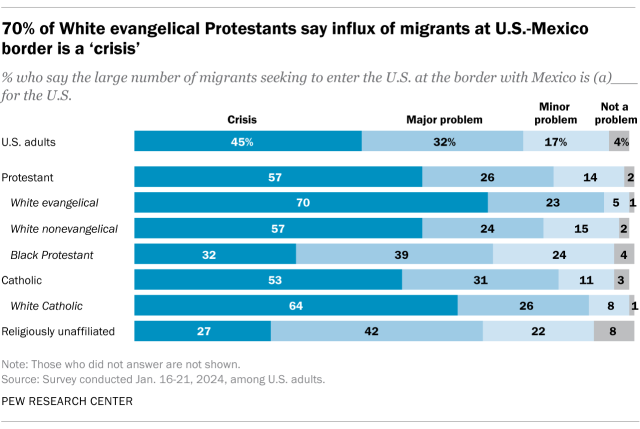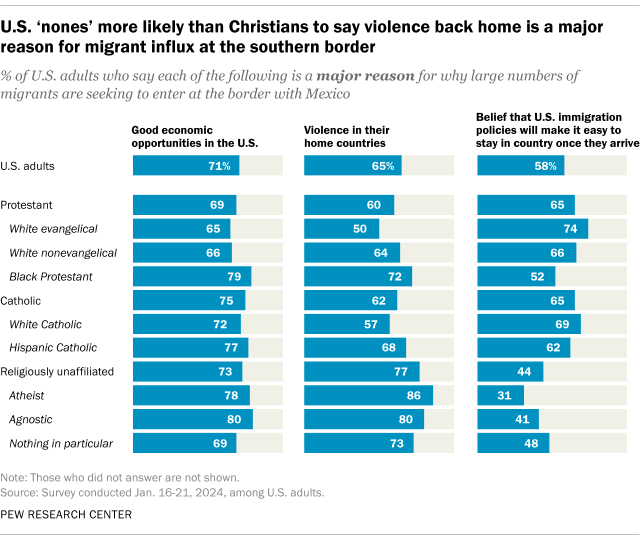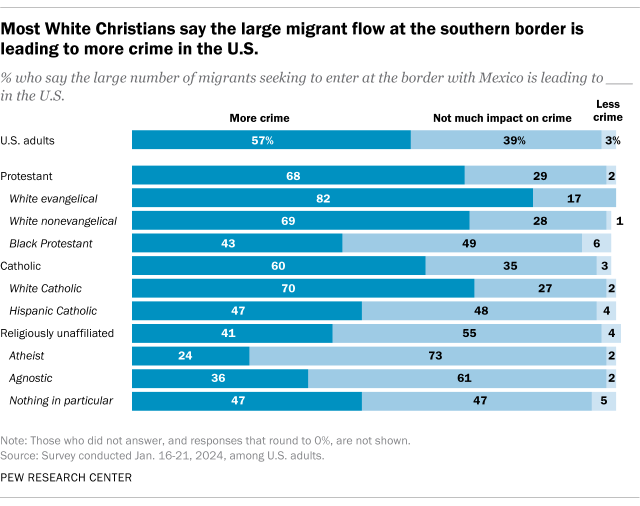Immigration is again a contentious issue this election year, and a large majority of Americans are dissatisfied with the government’s handling of the situation at the southern border, according to a recent Pew Research Center survey.
While most U.S. adults are unhappy with how things are going at the border, their views on the severity of the problem differ by religion.
Pew Research Center conducted this analysis to understand how Americans’ religious affiliation relates to their views about the large number of migrants seeking to enter the United States at the border with Mexico.
For this analysis, we surveyed 5,140 adults from Jan. 16 to 21, 2024. Everyone who took part in this survey is a member of the Center’s American Trends Panel (ATP), an online survey panel that is recruited through national, random sampling of residential addresses. This way nearly all U.S. adults have a chance of selection. The survey is weighted to be representative of the U.S. adult population by gender, race, ethnicity, partisan affiliation, education and other categories. Read more about the ATP’s methodology.
Here are the questions used for this analysis, along with responses, and its methodology.
Majorities of White Christian groups say the large number of migrants seeking to enter at the border with Mexico is a “crisis” for the United States:
- 70% of White evangelical Protestants
- 64% of White Catholics
- 57% of White nonevangelical Protestants
Many other people in these religious groups say the large number of migrants is a “major problem” for the U.S, while fewer than one-in-five people in each group say it is only a “minor problem” or “not a problem.”

Most Black Protestants and the religiously unaffiliated – people who describe themselves as atheist, agnostic or nothing in particular, and are often called “nones” – also say the situation at the border is at least a major problem. Compared with White Christians, however, smaller shares of Black Protestants and religiously unaffiliated adults say the situation at the border is a crisis.
The survey did not include enough responses from Hispanic Catholics and subgroups of religiously unaffiliated Americans to allow for separate analysis of whether they see the border situation as a crisis or not. However, other questions in the survey – which are examined in further detail below – do allow for separate analysis from these groups.
The survey did not have large enough samples of smaller religious groups, such as Jews and Muslims, to show their responses for any of the questions.
What’s causing the migrant influx?
There also are large divides by religion on views of why migrants are seeking to enter the U.S.
On the one hand, a majority of U.S. adults, and majorities of all the religious groups analyzed here, say that economic factors – whether poor conditions in migrants’ home countries or better economic opportunities in the U.S. – are a major factor behind the influx.

However, White evangelical Protestants are less likely than other religious groups to say that escaping violence in their home countries is a major reason why migrants come to the U.S. And they are more likely than most other groups to say that migrants come because they believe that U.S. immigration policies will make it easy for them to stay once they arrive.
Among White evangelical Protestants, half say violence in migrants’ home countries is a major reason behind the influx, compared with larger shares of White Catholics (57%), White nonevangelical Protestants (64%), Hispanic Catholics (68%) and Black Protestants (72%) who say the same. Roughly three quarters of the religiously unaffiliated, including 86% of atheists, take this position.
On the flip side, 74% of White evangelicals say a significant factor behind the influx is the belief that U.S. immigration policies will make it easy to stay, as do 69% of White Catholics, 66% of White nonevangelical Protestants and 62% of Hispanic Catholics. Fewer Black Protestants (52%) and religiously unaffiliated Americans (44%) say this is a major factor.
Is the migrant influx leading to more crime?
There has long been debate over whether migration leads to more crime. Studies have often shown that immigration is not associated with higher crime rates, but views are polarized along partisan lines.
In our recent survey, we asked Americans whether the large number of migrants seeking to enter at the border with Mexico is leading to more crime in the U.S., less crime, or not having much of an impact on crime.
White evangelical Protestants are more likely than those in other religious groups to say the situation at the border is leading to more crime in the country. Smaller but still substantial majorities of White Catholics (70%) and White nonevangelical Protestants (69%) say the same.
By contrast, among religiously unaffiliated adults, 58% say the situation at the border is either having little impact on crime or leading to less crime. Roughly half of Black Protestants and Hispanic Catholics share this view.

The differences between religious groups on many of these questions are in line with broader divisions between Republicans and Democrats. White Christians – especially White evangelical Protestants, but also White Catholics and White nonevangelical Protestants – mostly vote for Republican candidates. And far more Republicans than Democrats view the situation as a crisis and say the migrant surge leads to increased crime.
By contrast, Black Protestants, Hispanic Catholics and religious “nones” mostly vote Democratic. And Democrats are far less likely than Republicans to view the situation as a crisis or say the migrant surge is driving up crime.
